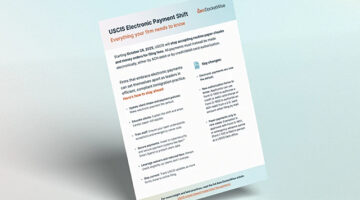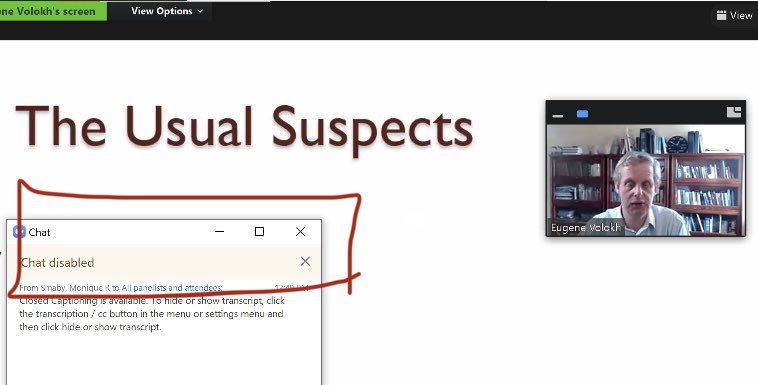
‘We just want to promote conversations… or not.’
The template is simple.
Step 1: Invite a campus speaker, preferably one with a history of making overtly racist remarks.
Step 2: When students and/or faculty complain, mount the highest horse available to rant about the importance of promoting “conversations.”
Step 3: Try to marginalize anyone who complains. If they can be derided over “professional decorum” or as a threat to democratic dialogue that’s a plus!

USCIS shift to electronic payments: What immigration firms need to know
As of October 2025, U.S. Citizenship and Immigration Services requires electronic payments for filing fees. Learn key updates, exemptions, and how firms can prepare.
Schools play out this farce over and over again and yet there’s always some sucker willing to take an administration at its word that it’s just trying to inject a little healthy debate into the campus. This behavior is only cliché because it works. But last week, UCLA’s Eugene Volokh took a virtual trip over to Pepperdine Law School and stripped bare the school’s lip service to honest discussion.
Rewinding to last year, Volokh was asked specifically not to use the n-word given that it’s a racial slur and there’s no academic justification for it in a world where everyone fully understands the expurgated form. Volokh took this earnest student request as the green light to immediately use the n-word, because that’s what libertarians do when confronted with an invitation to live in a civilized society with basic respect for other people. UCLA’s administration put out a general statement about tolerance — in response to another professor blaming Chinese students for COVID — prompting Volokh to launch into a public tantrum about how he refuses to apologize for using racial epithets.
Now in 2021, Volokh is appearing at a Pepperdine event. A coalition of 11 student organizations and a number of protestors petitioned the school to withdraw the invitation given the school’s purported commitment to creating a more inclusive environment. Volokh is an insightful scholar with interesting stuff to say… but so are a lot of people. Rewarding Volokh despite the publicity, a lot of generated by him, surrounding racial slurs seems sickeningly transactional. As though one can get out of all manner of offensive behavior by just being good at their day job. Apropos of nothing, Volokh clerked for Judge Alex Kozinski.
This brings us to step 2, and the school responded to the students with a form letter hitting all the expected tropes:

Pursuing The Pro Bono Story: A Conversation With Alicia Aiken
This Pro Bono Week, get inspired to give back with PLI’s Pursuing Justice: The Pro Bono Files, a one-of-a-kind podcast hosted by Alicia Aiken.
Thank you for raising your concerns and your advocacy on this matter.
We respect and understand your displeasure with the choice of Professor Volokh to speak in Dean’s Speaker Series. Others have shared with us their unhappiness with our choices of other speakers we have had in the series.
But one of the important goals of the Dean’s Speakers Series is to bring national leaders to our campus to engage with us in meaningful and sometimes difficult – dialogue across a range of important legal issues. For that reason, over the past two years we have brought in an array of speakers across the ideological and political spectrum. Professor Volokh is one of the nation’s leading First Amendment experts. Indeed, just last month he launched a new faculty-edited Journal of Free Speech Law with a board of editors of leading academics with diverse perspectives. We believe having him share his views on the free speech issues facing our country is consistent with the purpose of the Dean’s Speaker Series. We hope to have a robust question and answer period with Professor Volokh, as we do with all of our speakers.
We want everyone in our community to continue to hear from distinguished experts of different backgrounds and perspectives to sharpen our thinking on difficult legal issues. We encourage you to continue to advocate in this manner and hope you will nominate future speakers via the link on the Dean’s Speaker Series page.
See, it’s all about dialogue. How did that dialogue go?

Protests can raise some raw emotions and if a moderator wanted to nix posts with profanity or promoting violence, that would be one thing. This is a straight-forward and polite statement of protest at a free speech event about a guy who wrote last year that no amount of decorum should not silence him from using hate speech in class. And that sentiment was shut down by the host. The implication is that it was “inappropriate” to condemn hate speech. Step 3 complete.
At least this post was lodged — if only briefly. Eventually the school went a different route.

A rewarding back-and-forth. [UPDATE: Someone pointed out that the chat function was never open because the Q&A function was the intended site for dialogue. Which of course comically misses the point: the Q&A function was deleting all criticism and, lest one think the chat function provided an alternative forum, it was shut off too.]
As one Pepperdine law student noted on social media, the event came on the heels of a Pepperdine vs. Hate event where only one member of the administration bothered to show up and then left after 10 minutes.
It really drives home exactly where the priorities are in this profession.
Earlier: Prominent Law School Professor Drops The N-Word After Specifically Being Asked Not To Do So
UCLA Law School Calls For Tolerance, So Obviously Professor Blows That Up With Childish, Racist Tirade
 Joe Patrice is a senior editor at Above the Law and co-host of Thinking Like A Lawyer. Feel free to email any tips, questions, or comments. Follow him on Twitter if you’re interested in law, politics, and a healthy dose of college sports news. Joe also serves as a Managing Director at RPN Executive Search.
Joe Patrice is a senior editor at Above the Law and co-host of Thinking Like A Lawyer. Feel free to email any tips, questions, or comments. Follow him on Twitter if you’re interested in law, politics, and a healthy dose of college sports news. Joe also serves as a Managing Director at RPN Executive Search.